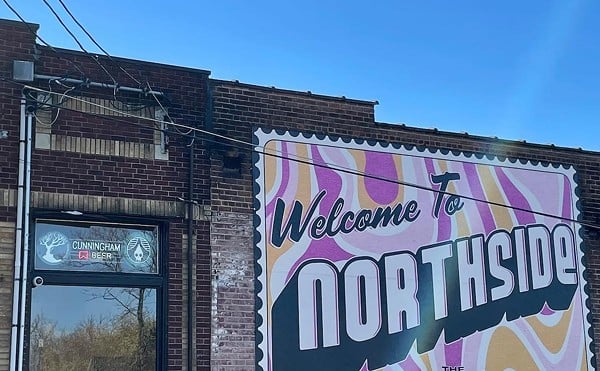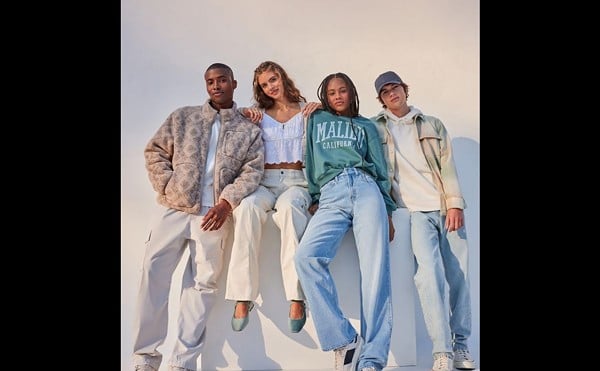|
Things can change quickly in the disposable, often fickle world of pop culture — just ask Paul Ruebens.
Yet for every Pee Wee-like fall from grace, the hands of fate sometimes point in welcomed directions: In four short months, New York City's Interpol has gone from obscurity to relative household name. This, folks, is a very good thing.
The quartet's first full-length, Turn On the Bright Lights (Matador), is a gorgeous creation of brooding romanticism; it's a stunning debut effort that melds late '70s, early '80s Post-Punk with the moody atmospherics of a menacing, unrelenting film noir. From singer/guitarist Paul Banks' ambiguous, desolation-ridden lyrics and strangely affecting vocal delivery to the sublime agility of its rhythm section to the angular, intertwining guitar lines of Banks and fellow axeman Daniel Kessler, Interpol is as singular as it gets — at least in the current millennium.
Turn On the Bright Lights is instantly recognizable yet utterly unique, a synthesis of its creators' impeccable record collections (especially from the aforementioned era) and an emotional immediacy rare of the current landscape's genre vultures.
Interpol is getting a lot of attention — Bright Lights was recently named the No. 1 record of 2002 by the gurus at online music 'zine,
|
Robin Kirsenbaum
Interpol's atmospheric take on Post Punk has made them one of the most talked about bands on the Indie Rock scene.
|
Things can change quickly in the disposable, often fickle world of pop culture — just ask Paul Ruebens.
Yet for every Pee Wee-like fall from grace, the hands of fate sometimes point in welcomed directions: In four short months, New York City's Interpol has gone from obscurity to relative household name. This, folks, is a very good thing.
The quartet's first full-length, Turn On the Bright Lights (Matador), is a gorgeous creation of brooding romanticism; it's a stunning debut effort that melds late '70s, early '80s Post-Punk with the moody atmospherics of a menacing, unrelenting film noir. From singer/guitarist Paul Banks' ambiguous, desolation-ridden lyrics and strangely affecting vocal delivery to the sublime agility of its rhythm section to the angular, intertwining guitar lines of Banks and fellow axeman Daniel Kessler, Interpol is as singular as it gets — at least in the current millennium.
Turn On the Bright Lights is instantly recognizable yet utterly unique, a synthesis of its creators' impeccable record collections (especially from the aforementioned era) and an emotional immediacy rare of the current landscape's genre vultures.
Interpol is getting a lot of attention — Bright Lights was recently named the No. 1 record of 2002 by the gurus at online music 'zine, pitchforkmedia.com — and deservedly so.
The French Connection
Despite being lumped into the recent crop of Gotham darlings, Interpol's formation actually dates back to 1997, when, in Kessler's words, "no one gave a fuck" about the New York scene.
Kessler and Banks met while studying French literature in Paris. The two then crossed paths, by sheer coincidence, a year later at New York University.
By this time Kessler had already recruited fellow NYU student Carlos Dengler to play bass. Thus Interpol's core was set. After parting ways with their original drummer, Sam Fogarino took over behind the kit in 2000, an addition the band cites as a definite turning point.
"Daniel gave me a demo of what the band was doing," says Fogarino, speaking by phone from his apartment in Brooklyn, N.Y. "I was absolutely floored by what I was hearing. I've always been enchanted with the idea of injecting a lot of atmosphere into the Punk aesthetic, and I thought that's what they did really well. I thought, 'I need to be in this band.' "
With Fogarino on board, Interpol recorded another demo and began to shop it around, specifically to esteemed NYC indie label, Matador Records.
"Daniel did the old 'send the demo thing' at attention to Gerard (Cosloy, the notoriously charismatic owner and co-president of Matador) and surprisingly got a response back. It was a positive one, but not the most positive," says Fogarino laughing at the recollection. "It wasn't like, 'Oh yeah, we're gonna sign you guys.' It was, 'Good stuff. Great,' and that was it.
"Then we opened up for (Matador signee) Arab Strap at the Bowery Ballroom in New York," he says. "I think that really did something — they finally got to see us live. That, coupled with the fact that they saw what we could do on our own — gaining popularity in the U.K. and Europe, playing European festivals, doing Peel sessions — I think that's what did it."
For a group of guys who have first-hand knowledge of the music business — Kessler previously worked at Jet Set Records; Banks is a former Interview magazine staffer; Fogarino was a record buyer for a distribution company in Chicago — the possibility of joining a label noted for its emphasis of artistry over commerce was a perfect match.
"Our first meeting with them was fucking surreal," says Fogarino. "I felt like I was meeting my favorite Rock band. It sounds hokey, but they put out some of my favorite music of the '90s: early Jon Spencer, Bailter Space, Pavement, Guided By Voices. And I'm sitting there with these guys, and (the meeting's) not about the music business; it's about music. Everybody was squirming in their seat. Nobody was comfortable: Gerard wasn't comfortable; we weren't comfortable; which actually made it really comfortable, you know? 'Cause we weren't having some meeting with some exec about moving units."
It's easy to understand why Matador bit: Interpol knows what they want — musically and visually. While Turn On the Bright's packaging design is just as ambiguous as Banks' lyrics, it's minimal black and red color scheme meshes perfectly with the band's lush soundscapes.
Conversely, no one can accuse these guys of ambivalence in the wardrobe department: Their stylish suits and mannered haircuts are enough to make David Bowie jealous. Yet don't go looking for trust funds around here.
"Maybe the truth has to come out that a lot of our suits are thrift store finds; you gotta piece things together. You know: the finest of the 1970s J.C. Penny collection (yields a hearty laugh from the doubtful interviewer). "It's true," says Fogarino laughing, "We shine shit.
"There is this unspoken aesthetic," he says of Interpol's noted visual care. "You don't want it to stop at the music. First of all, that could never happen with Interpol because of our collective personality; and second of all, I don't think it should. It's up to you as a band who created the album to direct things visually. And, man, was it an arduous process — as it usually is within this band. But that's just another facet of our quality control. It's very important to us."
The Name Game
Interpol is sick of comparisons. The band is irritated by the insistence of many critics to continually invoke the names of their so-called influences, some of whom Fogarino admits the band is unfamiliar with.
"Paul didn't even know who Ian Curtis was," he says of Banks' uncanny resemblance to the Joy Division frontman's vocal style. "On the surface I'm happy to agree with them; I'm happy to see that they can compare our music to something as good as Joy Division, The Smiths, Echo and the Bunnymen, The Chameleons, Television; any one of those great bands. There's definitely a shared quality. But it's purely a surface reaction."
He's right. Repeated listens of Bright Lights reveals it to be a richly textured, consistently rewarding experience. It's apparent the band's notorious inner conflicts — Fogarino recently told Magnet magazine that there's a "very thin thread of similarity that runs between us" — are a vital part of Interpol's creative process.
"That's (the tension) what makes Interpol what it is. It's that little bit of spark that we have under each other's asses that keeps the band going. And aside from all that tension and bickering, there's a massive respect for each other."
The other ingredient Fogarino is quick to cite in Bright Lights' success is veteran recording engineer Peter Katis. In early 2002 the band convened to the quaint New England coastal hamlet of Bridgeport, Conn., for the tense, often exhausting recording of Bright Lights, which Katis was integral in shaping.
"He had the right psychology in the studio, and he empathized with the music. Peter was definitely a beautiful, silent fifth member of the band and helped to pull it all together. Although there's no production credit, he discreetly produced the record in a very subtle way. He usually had an unimposed final word that everybody respected. (The recording process) is almost like trying to harness this nebulous that's flying around, and you need somebody to turn that into a solid form and get it onto tape. Without Peter, it would've just remained mist in the studio."
Hopefully, the resulting mist contained within Turn On the Bright Lights is just the beginning of what this strikingly passionate band has in store for us. And though the hype machine is still in its early stages (they recently made their first television appearance on the Late Show with David Letterman), don't expect Fogarino to be whining anytime soon.
"At the end of the day, I have no right to complain," he says of the increasing hoopla surrounding the band. "I feel blessed to have been put in this position. The whole thing's kinda mad."
INTERPOL plays the Southgate House Friday with Calla and Mallory.





